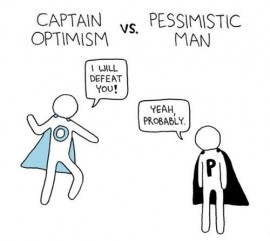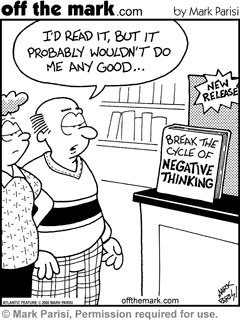
How to train your brain for optimism
 So what's Martin E. P.
Seligman's recipe for learned
optimism? The idea
is to focus on the negative thoughts that run through your mind right
after you've been slapped the face with a setback.
So what's Martin E. P.
Seligman's recipe for learned
optimism? The idea
is to focus on the negative thoughts that run through your mind right
after you've been slapped the face with a setback.
As
I mentioned yesterday,
pessimists make every adversity personal ("It's my fault. I'm such a loser!"),
pervasive ("This is going to ruin everything!"), and permanent ("The
awfulness is going to last forever!"). Optimists do just the
opposite, attributing setbacks to external forces, compartmentalizing
negative results into a single aspect of their life, and realizing that
all bad things pass given enough time.
Okay, I can hear you now
--- what about when it really is your fault and the problem
really is going to ruin your life
forever? First of all, Seligman admits that in some situations,
pessimists have been shown to have a more accurate view of the world.
"If the cost of failure is high, optimism is the wrong strategy," he
warns, citing airplane pilots trying to decide whether to de-ice an
extra time and folks contemplating extramarital affairs as people who
would be better off staying pessimistic for the near future.
 However, in most scenarios,
Seligman finds that our pessimistic worldviews are equally skewed in
the opposite direction, in which case retraining your brain for
optimism will improve your health and energize you to reach your
fullest potential. Want to give it a shot? Start out with his first
exercise --- every time you experience a setback today and tomorrow,
write down what happened, the feelings and beliefs that immediately ran
through your head, and how those thought processes skewed the rest of
your hour or day.
However, in most scenarios,
Seligman finds that our pessimistic worldviews are equally skewed in
the opposite direction, in which case retraining your brain for
optimism will improve your health and energize you to reach your
fullest potential. Want to give it a shot? Start out with his first
exercise --- every time you experience a setback today and tomorrow,
write down what happened, the feelings and beliefs that immediately ran
through your head, and how those thought processes skewed the rest of
your hour or day.
For bonus points, try to
think up alternative reactions that would have felt less personal,
permanent, and pervasive. Would realizing that the average test grade
in your class was a C make your B look pretty hot? Would remembering
how you dealt with a similar problem last week help you realize that
there is a path through the awfulness?
Then, when you're done,
you might want to check out the other exercises in
Seligman's book.
Enjoy!
Want more in-depth information? Browse through our books.
Or explore more posts by date or by subject.
About us: Anna Hess and Mark Hamilton spent over a decade living self-sufficiently in the mountains of Virginia before moving north to start over from scratch in the foothills of Ohio. They've experimented with permaculture, no-till gardening, trailersteading, home-based microbusinesses and much more, writing about their adventures in both blogs and books.
Want to be notified when new comments are posted on this page? Click on the RSS button after you add a comment to subscribe to the comment feed, or simply check the box beside "email replies to me" while writing your comment.

I'm the eternal optimist. I force myself to be that because the other guy deep down inside isn't! Here are a couple of smiles for you:
Red Green says the pessimists are more accurate, but the optimists live longer....
The optimist says, "This is life as good as it can get!" The pessimist is afraid he is probably right....
Cheers,
TBI
As an engineer it is often my moral duty to be a pessimist. To think "what could possibly go wrong", in order to try and prevent such events. We call this Failure Mode and Effect Analysis. This is especially important if lives are at stake. But we grade failure modes by a combination of three properties; how bad the effect would be, what the chance is that the failure occurs and whether there is a mechanism to prevent (control) it.
This has however taught me to think about degrees of control/influence, and to appreciate the traditional and modern variant of the Stoic philosophy.
We have varying degrees of control or influence over the events in our life. I would state that I only have to think/worry about (possible) events in proportion to the amount of control that I have over them. (For the ancient Stoics control was a yes/no question, these days we recognize that it's more of a continuum.)
Sometimes you see pessimistic people worry about possible events that originate outside of their sphere of influence. In the Stoic tradition, while you have to deal with such events, there is no sense in worrying worry over them.
I remember the first time I heard the word optimist. Come to think of it, it also was the first time I heard the word pessimist too. I must have been in the 8th grade, or younger. I am slow with vocab words, so 8th might seem sluggish but I think that is when it was. Anyway, I was walking in the cemetery with my sister, walking the dogs, and my sister who happened to tell me I was the big word starting with O was Anna Hess. She then told me she was the P word.
Maybe it's just optimistic thinking, but I think the ideas I developed around optimism since then have been pretty important. Specifically, I think optimism is a word created by people like introvert or extrovert, like Democrat or Republican, like good or bad, or like feminine or masculine. I think it is important to think about the fact that all of these things exist in each of us on a continuum.
When I had a terrible trauma at age 24 or thereabouts, my response was some of these same ideas that ring of pessimism. But I've had other bad things happen and I dusted myself off and made lemon pie.
I think you are this way too. I know a bit of your story, and I think one of the huge negative events I recall you experienced was the vulnerable problem of being excommunicated from the United States by the Watson fellowship, and then having your younger sister become terribly ill with her first mental breakdown.
Maybe you think you responded in a Pessimistic way. But I see optimism in your actions. You camped around all over the place in Europe! A single woman alone, you stayed among tourists, vagrants, relatives, and as a person who needs a lot of restorative alone time, (introverted tendencies) you showed that you are a rock star above all else. Then what did you do? You got on a plane and kept going. You didn't fly home like I would have done if my goldfish was sick at home. You wanted to. But you brushed yourself off, and flew to the Southern Hemisphere to finish your year. In that year you did so much creative flourishing. You filled at least 5 notebooks with sketches and stories about botanical evolution. Wow. Talk about lemon pie. But also, and most important to me, you called your United States family, asked if it would be safe to take your younger sister (me) to Costa Rica on a leg of the trip, and I got to go make some (sometimes literal) pie there too.
Sorry for rambling a bit. My succinct point? You are not an optimist or a pessimist and though I am so glad for you reading this book and getting things out of it, I think it is important you use more expansive self defining language. You are a young woman who sometimes has optimistic tendencies, and other times your pessimistic response abounds. Sure you are learning to be more optimistic more often. But I think it is a meaningful point I am making here that there are shades of gray in most things, and it helps to think of ourselves as mixed beings.
Thank you for reading.